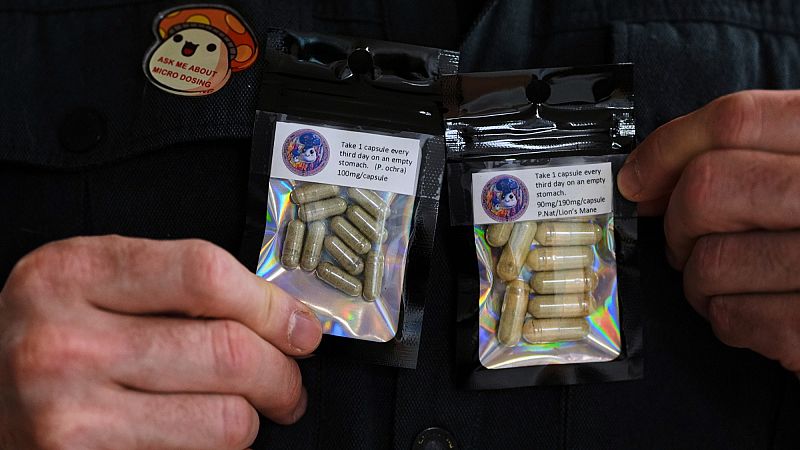
Microdosing is gaining popularity with a new breed of health seekers.
These self-experimenters take a very small amount of psilocybin mushrooms or LSD to try to reduce anxiety, stress, and depression. Some claim the practice gives them access to joy, creativity, and connection they can’t get otherwise.
This isn’t a full-blown acid trip – or even close. If you see visions, it’s not a microdose. People who microdose don’t do it every day. Instead, they take tiny doses intermittently, on a schedule or when they feel it could be beneficial.
One small study suggests any psychological benefits come from users' expectations, in what’s known as the placebo effect. But the science is still new and research is ongoing.
The substances are illegal in most places, but the wave of scientific research focused on the benefits of supervised hallucinatory experiences has spurred two US states to legalise psychedelic therapy. In the European Union, these treatments are available only in research settings.
What are people who microdose reporting?
“I started microdosing and within a couple of months, I had a general sense of well-being that I hadn’t had in so long,” said US military veteran Matt Metzger.
He grows his own mushrooms in Washington state, where psilocybin has been decriminalised. Taking small amounts of psilocybin helps him cope with PTSD, he said.
In Colorado, Aubrie Gates said microdosing psilocybin has made her a better parent and enhanced her creativity.
“It makes you feel viscerally in your body a new way of being, a more healthy way of being,” Gates said. “And so instead of just, like, thinking with your conscious mind, ‘Oh, I need to be more present,’ you feel what it feels like to be more present”.
What does the science say about microdosing?
These kinds of claims are hard to measure in the lab, say scientists studying microdosing.
For starters, belief is so important to the experience that empty capsules can produce the same effects.
In one study involving people who microdose, participants didn’t know until afterwards whether they had spent four weeks taking their usual microdose or placebos. Psychological measures improved after four weeks for everyone in the study, regardless of whether they were taking microdoses or empty capsules.
“It appears that I was indeed taking placebos throughout the trial. I’m quite astonished,” wrote one of the study participants.
“It seems I was able to generate a powerful ‘altered consciousness’ experience based only [on] the expectation around the possibility of a microdose”.
Scientists haven’t found lasting effects on creativity or cognition, according to a review of a handful of small placebo-controlled trials of microdosing LSD.
One small study did find glimmers of an effect of small LSD doses on vigor and elation in people with mild depression when compared with a placebo.
“It may only work in some people and not in other people, so it makes it hard for us to measure it under laboratory conditions,” said University of Chicago neuroscience researcher Harriet de Wit, who led the research.
The potential has spurred an Australian company to conduct early trials of microdoses of LSD for severe depression and in cancer patients experiencing despair.
Meanwhile, few rigorous studies of psilocybin microdosing have been done. Researchers in the UK are studying the effects of microdosing on depression, anxiety, and other mood problems.
A few words of caution about microdosing
Even microdosing advocates caution that the long-term effects have not been studied in humans.
Other warnings: Unregulated products from shady sources could contain harmful substances. And accidentally taking too much could cause disturbing sensations.
The nonprofit Fireside Project offers free phone support for people during a psychedelic experience and has received hundreds of calls about microdosing.
“People may call just to simply process their experience,” said project founder Josh White, who microdoses the plant iboga and LSD to “continue to deepen the insight about my life” that he gained in a full-blown psychedelic experience.
Balazs Szigeti of the University of California, San Francisco, who has studied microdosing, said it may be a way to harness the placebo effect for personal benefit.
“It’s like a self-fulfilling prophecy,” Szigeti said.







